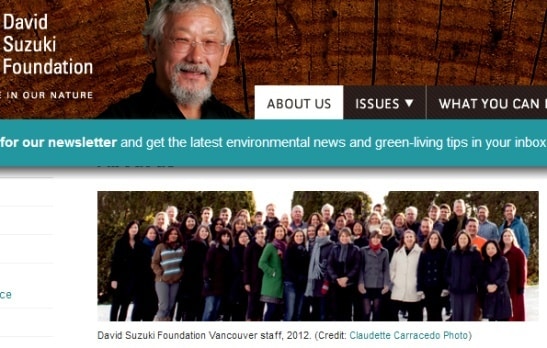If “constant growth” is bad, why does the David Suzuki Foundation keep getting bigger and bigger?
According to eco zealots, growth is a bad thing because it increases our environmental footprint. On page 2 of his latest book, David Suzuki complains that our economic system is
based on constant growth and ever-expanding exploitation of finite resources on a finite planet.
At the beginning of a chapter titled Is the Economy.Stupid? he talks about our “current economic paradigm” and “what an economy is supposed to do.” He declares that our “economic system is a human invention that can be modified, improved or changed to suit our needs” and reiterates:
It’s absurd that we still rely on a recently devised economic system based on endless growth when we live on a finite planet.
Err, reality check time. Suzuki is a geneticist by training. I’m aware of no evidence that he has taken a single course in economics. Many people in this world have PhDs in that field. They’ve spent decades exploring the nuances of economic theory. Suzuki is not one of them. He is as much an amateur in economics as I am in genetics.
If he wants to talk about absurdities, let’s start with the fact that someone who knows so little about that field has spent so much of his time subjecting the rest of us to his unsophisticated economic perspective.
That perspective utterly lacks originality. It is associated with a particular worldview, one that can be summed up in two words: capitalism sucks.
Beneath their green veneer, large numbers of environmentalists turn out to be old-school lefties who still don’t get it. They cling to the childish fantasy that the world economy can be “fixed” – that it can be manipulated like a puppet on a string. In this fantasy world, unintended consequences never occur, and people don’t have minds of their own. Instead, they behave exactly as green crusaders expect and want them to.
In recent years, eco activists have organized “de-growth” conferences. As a FAQ prepared for a 2012 de-growth gathering explains, the problem with contemporary society is that we subscribe to the “religion of growth” and have been misled by “the lying dogma of unlimited growth in a finite world” (backup link).
So here’s my question to these crusaders: If we’re all supposed to be making do with less, if we’re supposed to be contracting – rather than expanding – our use of resources, if growth is a pernicious concept, why have green organizations themselves been growing like bad weeds?
The David Suzuki Foundation was incorporated in 1990. In his autobiography, Suzuki says its first office
was above an automobile repair shop and was cheap.The roof leaked, the wastebaskets were populated with mice, and everything we had in the office – a raggedly collection of furniture and shelves – was borrowed or donated.

For the first two years, its only staff member was a volunteer – Suzuki’s wife, Tara Cullis.
Today, the Suzuki Foundation is housed on the second floor of a building in trendy Kitsilano – a Vancouver beachside neighbourhood packed with vegetarian restaurants, yoga studios, and surf shops.
A 2012 staff photograph displayed on the Foundation’s website until recently included 47 people. The new, 2013 staff photo may be seen here. By my count, nearly 60 individuals are now employed in that office.
But the Suzuki empire doesn’t end there. This Foundation has offices in three other cities – Toronto, Ottawa, and Montreal.
If “constant growth” is wrong, if the “ever expanding” use of resources is a bad thing, why does the Suzuki Foundation keep getting bigger and bigger?
Nor is it the only one. In 1971, Greenpeace was an “upstart peace group from Vancouver” that held meetings in a Unitarian church. After it chartered a 30-year-old “creaking fish boat” to protest a US nuclear arms test, it could barely afford to pay for the boat’s fuel (see this 1996 book).
Fast forward four decades and, by 2010, the Guardian was reporting on Greenpeace’s custom-built £14 million ($22 million US) mega-yacht.
Why is that kind of growth OK?
At this very moment, the Environmental Defense Fund (EDF) has an opening for an intern in Texas. The online job posting includes the following in its first paragraph:
This leading green group, with programs from Boston to Beijing, has tripled in size over the past decade. [bold added, backed up here]
The past decade has been a challenging time for many of us. People have lost their jobs, their homes, and much of their savings. Some individuals will never recover from the disorientation associated with those experiences.
Against that grim economic backdrop, the EDF has not only weathered the storm, it has grown by 300 percent.
It brags about this growth. Just as the online bio of Peter Robinson – the Chief Executive Officer of the Suzuki Foundation – brags that, during the eight years in which he was formerly employed at an outdoor equipment retailer,
he led the organization through a period of sustained sales and membership growth across Canada.[backed up here]
Count me totally confused. Growth is bad. Except when green groups expand their offices from one to four – or triple their overall size.
Consumption is bad. Except when Greenpeace buys yachts and the Suzuki Foundation cites sales figures.
Once again, it becomes apparent that greens don’t practice what they preach. They’re keen to condemn the rest of us, but they themselves are incapable of living by the rules they propose.
At best, these people are philosophically and morally incoherent – old-fashioned hypocrites.
At worst, they’re working toward a society in which there are two classes of citizens: the green elites whose influence and consumption keeps expanding – and ordinary folk, the unwashed masses.
It’s our lives, choices, and opportunities that will have to be restricted. After all, the planet needs saving.






